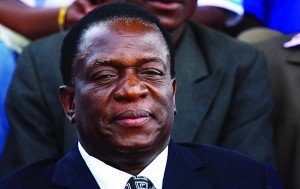Source: Wanton VP dismissals expose constitutional shortcomings | The Financial Gazette November 9, 2017

Former vice President Emmerson Mnangagwa
THIS week’s summary dismissal of Vice President, Emmerson Mnangagwa, by President Robert Mugabe — the second inside a single term after the dismissal of Joice Mujuru barely three years ago ― is a result of the concentration of constitutional power in one pair of hands, legal experts say.
This week, legal analysts who spoke to The Financial Gazette revealed that these dismissals ― which have a disruptive effect on government business ― have been made possible by weak safeguards in both the constitution of the ruling ZANU-PF party and national Constitution, because both documents give unfettered powers to Mugabe.
This week Mugabe gave Mnangagwa the marching orders, with the veteran ruler accusing his long-time ally of disloyalty, the same charge brought against Mujuru in 2014.
Constitutional law expert, Alex Magaisa, who took part in the drafting of the country’s new Constitution which became effective in 2013, said Mugabe is able to wantonly settle personal grudges with those within his party whom he sees as a threat as he did with Mujuru and now Mnangagwa because he has the powers to hand-pick his deputies, instead of having them as running mates.
“If the running mate clause had been accepted, all this would not be happening,” Magaisa said in an interview this week.
A vice president who comes into office by virtue of having been the president’s running mate cannot be fired because they derive their mandate directly from the electorate. The clause providing for vice presidents to be the president’s running mates in an election is included in Section 92 (2) of the Constitution, but the partners in the coalition government that brought about the Constitution agreed to keep this clause in abeyance for ten years to 2023.
“The irony is that it was ED’s (Mnangagwa) group that did not want the running mate clause because it would have benefited Joice Mujuru. So, after we had put it in the Constitution, they fought to remove it,” Magaisa added.
Zimbabwe Lawyers for Human Rights (ZLHR) programmes manager, Dzimbabwe Chimbga, concurred with Magaisa that Mugabe wields too much power.
“Yes, for sure… they have created this monster through changes of an internal (party) constitution supported by a (national) Constitution that creates a too powerful president, further complicated by a two-thirds (majority) in parliament,” Chimbga said.
The ZANU-PF constitution gives Mugabe sweeping powers to handpick his deputies, the party’s national chairperson, and all members of the key decision-making Political Bureau (politburo).
Until the Running Mate clause comes into effect, under the current Constitution, a vice president serves at the pleasure of the President. Mugabe has already started making use of the two-thirds majority that his party has in Parliament to change those clauses of the Constitution that he does not want.
In a move described by legal experts as tantamount to vandalising the Constitution, he has already changed a clause dealing with the appointment of judges to give himself powers to appoint the Chief Justice, the Deputy Chief Justice and the Judge President of the High Court.
A strong constitution in Malawi ensured that even when that country’s late president, Bingu wa Mutharika and his deputy, Joice Banda were estranged, he could not dismiss her from her position because having been his running mate, she could only be expelled by the same electorate whence she derived her mandate. When wa Mutharika suddenly died in 2012, Banda automatically succeeded him because the constitution was very clear on the succession matrix.
COMMENTS